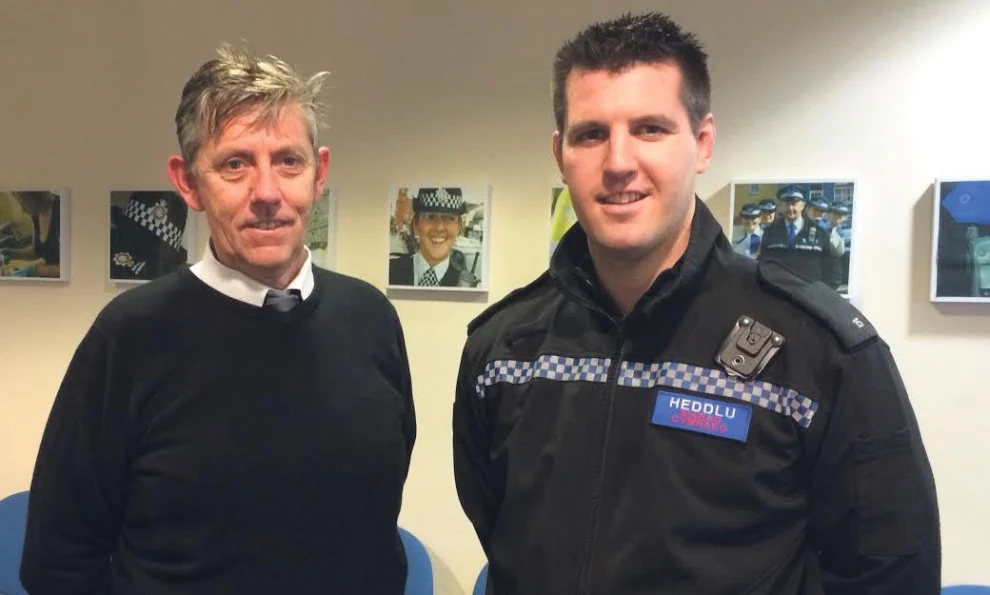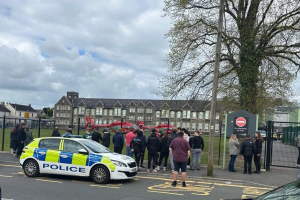
by a team of 11 officers who have received training.ill
DYFED-POWYS POLICE and Hywel Dda University Health Board have joined forces to help people in mental distress over Christmas, and reduce the amount of times police cells are used as places of safety for those waiting to be assessed. A triage service has been operating for the last two weekends, and will also be available this weekend. The service, based in Carmarthen Police HQ is led by PC Celt Thomas and mental health practitioner, Edward McHugh. They are supported by a team of 11 officers who have received training.
The team have access to police and health records, and are able to provide background information to officers so they can provide specific assistance to people who need tailored help. Most information and advice will be provided to officers remotely, via telephone or police radio contact. The service also aims to reduce the use of Section 136 of the Mental Health Act and to provide better signposting and pathways into services for people following incidents. Evidence from the national pathfinder triage pilots show that having a mental health triage service significantly reduces the number of Section 136 detentions.
The practical benefits of mental health triage include access to patient records, information, intelligence, and specialist advice to enable better decision-making at the scene of incidents, a range of tactical options being made available to police officers as alternatives to detentions under Section 136 of the Mental Health Act, proactive signposting and referral to wide range of services and better communication between agencies. Det Superintendent Andy John said: “This isn’t the first time we have worked together to provide this service. Last December, we ran the service for four evenings in December.
“It resulted in providing information and advice to officers in relation to 34 incidents, averting two Section 136 detentions and supporting an elderly couple to remain at home. Without the service, both would almost certainly have been admitted to hospital for different reasons. Referring vulnerable people for additional services and support, including young people, enabling direct admission to residential Mental Health wards. As a result of this, Dyfed Powys Police and Hywel Dda University Health Board agreed to formally pilot the service for a year, and established a Project Board to develop and oversee the pilot.
Karen Howell, Chief Executive (Interim) of Hywel Dda University Health Board said: “The street triage service is a fantastic example of prudent healthcare – healthcare that fits the needs and circumstances of patients whilst avoiding wasteful care not to the patients benefit. By working together, different organisations will provide a more timely assessment of a person’s mental health and a more positive experience for the times when they come into contact with a police officer.”
Dyfed-Powys Police and Crime Commissioner Christopher Salmon, who secured Home Office funding of £90,000 for the new service, said: “I want to help vulnerable people – and this practical and useful service will do that. “This service provides an appropriate service to people in mental distress at the earliest opportunity – and will save time and money for the police, ambulance and health services. “It offers new support to individuals at a time when they’re particularly vulnerable and will help Dyfed- Powys Police and others become more effective on the front line.”
Key partners on the project board include: Dyfed Powys Police; Hywel Dda University Health Board; Carmarthenshire, Pembrokeshire & Ceredigion Local Authorities; West Wales Action for Mental Health; University of South Wales and the Welsh Ambulance Service The Triage service will be formally evaluated by a postgraduate student of the University of South Wales, who will undertake both a quantitative and qualitative evaluation with service users. The student is also a service user, and has shared her experiences with Project Board member in order to shape and enhance the service.
















Add Comment